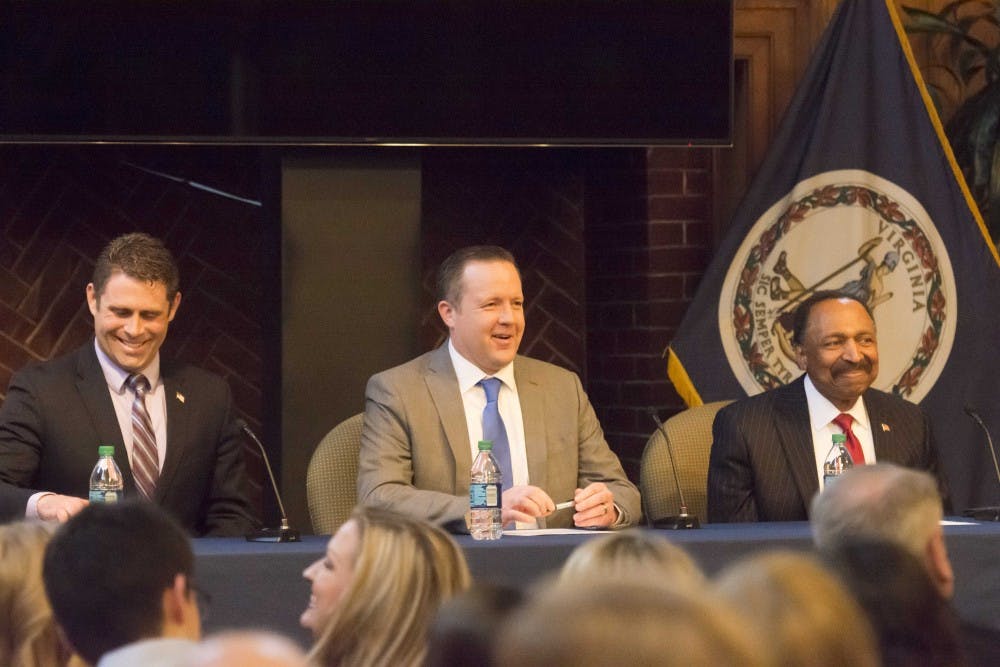The University College Republicans hosted a debate Tuesday for three candidates seeking the Republican Party of Virginia’s nomination in the upcoming U.S. Senate race. Batten Dean Allan C. Stam and Andrew Pennock, assistant professor of public policy, moderated the debate at Garrett Hall, which touched on several issues, including the role of Congress in infrastructure reform and climate change.
Del. Nick Freitas (R-Culpeper), Pastor E.W. Jackson and Corey Stewart, chairman of the Prince William County Board of Supervisors were the three candidates who participated in the debate. The three candidates will be included on the ballot in the GOP primaries June 12, and the candidate with the most primary votes will appear on the ballot Nov. 6. The Republican primary victor will face off against Democratic incumbent Sen. Tim Kaine in the general election.
Adam Kimelman, a third-year College student and chair of the College Republicans, said the idea for hosting the debate was originally conceived by the College Republicans in September 2017. According to Kimelman, the organization then reached out to the Batten School about the possibility of co-hosting the debate, an idea which he said the school was immediately receptive to.
Representatives from the College Republicans were directly responsible for reaching out to each of the three campaigns — who Kimelman said were all enthusiastic about the opportunity to debate at the University — to organize the debate itself.
The debate was structured so that each question was asked to an individual candidate, who was given 90 seconds to answer the question. Afterwards, the two other candidates were each given 60 seconds to respond to their opponent or answer the question themselves.
While all questions were curated by the debate moderators, they were mixed from different sources. The audience of 180 people was encouraged to ask the candidates questions. The College Republicans also provided an online link for their social media event so that those unable to attend the event were able to submit questions as well.
The debate began with opening statements by all three candidates limited to two minutes each. The candidates directed their statements at the University community in particular.
“I’m not here to reaffirm the propaganda given to you by professors,” Stewart said. “The Constitution is under threat … When you leave [college] you come back with beliefs that are antithetical to the constitution …What happens when it’s your speech that somebody else finds offensive?”
Freitas said the current political climate in the United States is a time to consider how American politics will progress in the future.
“I’m tired of politics in this country dissolving,” Freitas said. “We’re at a crossroads to determine where we go for the next generation.”
Jackson said that the United States is a unique political system in the modern world which deserves protection.
“The constitutional republic that we've been given is different than anything on the face of the earth,” Jackson said. “I fight for the future of those who come after you.”
During the debate portion, each candidate was asked various questions on a wide range of topics — particularly on whether or not they agreed with choices and policies passed by Congress.
A question concerning Congress’s decision to allocate over half a billion dollars to the Washington, D.C. metro system allowed the candidates to voice their opinions about President Donald Trump’s proposed plan to stimulate $1.5 trillion in infrastructure spending over the next decade.
“The federal government does have some responsibility to build some interstate infrastructure system,” Stewart said. “The fact of the matter is that I-81 in particular is stressed… it’s not just a Virginia responsibility… I will be supporting Trump’s bill to repair I-81 and I-95.”
Jackson said Trump’s unconventional rhetoric as displayed through his Twitter usage should not overshadow the president’s potential efforts to fund infrastructure development.
“Don’t pay attention to his tweets, pay attention to his actions,” Jackson said. “Our road systems are a part of interstate commerce ... The federal government has a responsibility … to make sure we have interstate commerce functioning properly.”
Many of the audience members and those who submitted questions online asked about where the candidates stood on issues of climate change and rising sea levels.
Stewart challenged the established scientific consensus that man-made climate change is actively affecting the earth.
“I believe that the theory of man-made climate change is a hoax,” Stewart said. “The Paris Agreement would have limited the growth of our economy, I agree with President Trump … the only way we can get to the truth is free speech.”
Freitas agreed with Stewart and said the scientists conducting climate change research should not be in charge of policy development.
“Scientists immediately go into a policy discussion,” Freitas said. “They are not qualified as experts in respect to public policy.”
Each of the candidates also had strong opinions on the recent omnibus spending bill passed by Congress. An omnibus spending bill is one that packages smaller appropriations bills into one larger one that can be passed with only one vote from each house.
“It was horrible,” Jackson said. “I’m sorry the president signed it… I’m tired of being betrayed by people in the U.S. government who say they’re Republican.”
Stewart said the bill was largely in favor of traditionally Democratic policies.
“It was really the [Democratic Sen.] Chuck Schumer bill,” Stewart said. “It funded Planned Parenthood, sanctuary cities … and not a single dime for the construction of a wall.”
Kimelman said there were two main takeaways attendees of the debate should have.
“I think that the takeaway should be one, to be involved, and two, if you’re a Republican, start thinking how our party can start reaching back to young voters,” Kimelman said.
Kimelman also encouraged all students to register to vote in the primary elections which will be held June 12 and the general election Nov. 6.







